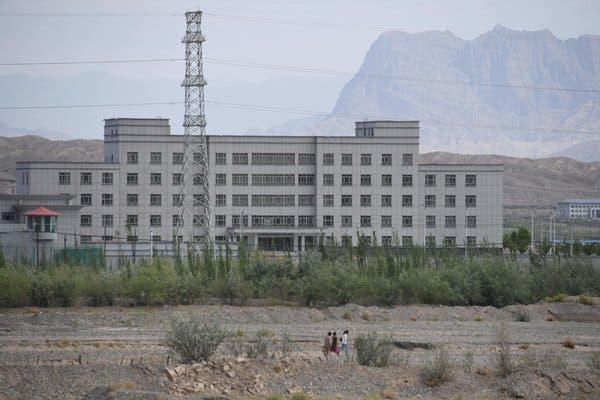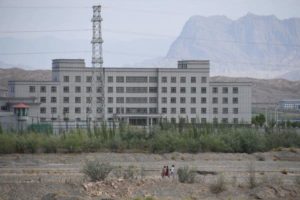China Says Most Muslims Have Been Released From Camps. Others Say: Prove It.

The New York Times, 30 July 2019
 By Chris Buckley The Chinese government claimed victory in its vast and contentious detention program for Muslim minorities on Tuesday, when senior officials said that most inmates held in internment camps across the Xinjiang region had been released and given work.
By Chris Buckley The Chinese government claimed victory in its vast and contentious detention program for Muslim minorities on Tuesday, when senior officials said that most inmates held in internment camps across the Xinjiang region had been released and given work.
But experts and members of Muslim minority groups from Xinjiang who have fled abroad quickly contested the claim, saying there was no evidence of mass releases and that people nominally freed from camps often remained in effective captivity.
At a news conference in Beijing, two of Xinjiang’s top leaders indicated that the majority of inmates — and maybe 90 percent or more — had “returned to society.” Their abrupt and largely unexpected announcement appeared to be China’s latest effort to defuse international criticism of the re-education camps, which experts estimate have come to hold a million or more Uighurs and other ethnic minority Muslims since the camps began to expand rapidly in 2017.
Western governments have grown increasingly vocal about the sweeping detentions in Xinjiang, a region in northwestern China. Members of the Trump administration have taken up the issue and threatened to impose sanctions against officials who are involved. This month, Secretary of State Mike Pompeo called China’s internment of Muslims “the stain of the century.”
“Presently, the majority of people who have undergone education and training have returned to society and returned to their families,” Alken Tuniaz, the vice chairman of the Xinjiang government, told reporters. He used the government’s official description of the camps as “education and training” centers and of their inmates as “students.”
“Most have already successfully achieved employment,” he said. “Over 90 percent of the students have returned to society and returned to their families and are living happily.”
Both he and Shohrat Zakir, the government chairman, refused to say how many people have been held in the camps, which are often large clusters of buildings surrounded by fences and guards.
Official Chinese media accounts of the two officials’ comments varied, raising the possibility that they misspoke and their comments had to be drawn back. Some cited the Mr. Zakir as saying that 90 percent or more of people from camps had returned to society. Others said, citing him, that 90 percent of those releasedhad found suitable work.
Gathering evidence to test their claims of numerous releases from the camps is likely to be difficult. Foreign journalists are closely monitored and controlled when they visit Xinjiang, and independent investigators and human rights groups do not have free access.
Uighurs living abroad said they had not found evidence of widespread releases.
“Uighurs abroad continue to be unable to reach their relatives in the region. No phone calls, no internet communications,” said Tahir Imin, a Uighur activist based in Washington.

“If the Chinese government is honest and confident in what it’s saying to the media, it should allow people to communicate freely and go out of the country freely and allow independent media to visit and investigate freely,” he said.
Xinjiang is home to more than 11 million Uighurs, a largely Muslim minority, and their treatment has become a global human rights controversy under President Xi Jinping. Western governments, United Nations human rights experts, and advocates of Uighur self-determination have condemned the increasingly harsh restrictions on many Uighurs, especially the re-education camps.
The Xinjiang officials described the camps as benign facilities that offer Chinese-language instruction, vocational training and classes that have effectively inoculated Uighurs against the temptation to embrace religious extremism or terrorism. Until several years ago, Xinjiang had experienced a string of primitive but deadly attacks by discontented Uighurs.
But former camp detainees who have left China say they were subjected to a high-pressure indoctrination program with the goal of removing devotion to Islam and instilling loyalty to China and its ruling Communist Party.
The Xinjiang officials’ ambiguous wording on Tuesday left room for uncertainty as to how much freedom can be exercised by inmates who have been released. Though they did not detail the circumstances under which detainees were being “returned to society,” it is possible that people released in name are in fact still under heavy restrictions or being assigned to work at factories run under tight security.
James Leibold, an associate professor of politics at La Trobe University in Australia who has studied the wave of mass detentions in Xinjiang, said those factories are often linked to the camps, and that inmates assigned to work there live under heavy guard and monitoring.
“I find it highly unlikely, and frankly inconceivable, that the Chinese Communist Party would build this massive network of internment camps and then simply mothball them a couple of years later,” Professor Leibold said by email. “Rather, the purposes of the camp were perhaps always meant to evolve over time, shifting from education to production, while their coercive, nonvoluntary and extrajudicial nature remains the same.”
At the news conference, Mr. Zakir, the regional chairman, also appeared to suggest that people from camps were being assigned factory jobs.
“You could say that maybe 90 percent or more — have found suitable work to their liking with an impressive income,” he said. “These people have now become a positive factor in society, leading other ordinary people to create business and employment.”
Mr. Zakir is Xinjiang’s most senior Uighur official, and has repeatedly served as the public face defending Chinese government policies in the region, including the re-education camps.

In October, party officials began to publicly acknowledge and defend the camps, many of which are large, prisonlike facilities behind walls. In March, Mr. Zakir likened them to boarding schools.
The Chinese government says the camps and other sweeping security measures have extinguished bloody antigovernment attacks by Uighurs. But critics say the mass detentions of Uighurs and other Muslim minority groups are sowing bitterness that could be even more dangerous.
Earlier this month, a group of 22 countries, including Australia, Britain, Canada, France and Germany, issued a statement urging China to halt the mass detention of Uighurs and other Muslims. China struck back with a letter signed by 37 ambassadors from countries in Asia, Africa, the Middle East and Latin America who praised its human rights record, including the “de-radicalization” policies applied in Xinjiang.
Human rights groups quickly responded to the latest announcement with skepticism.
“They lied about the existence of the camps, they admitted the camps existed and lied about what happens inside them,” said Sophie Richardson, the China director at Human Rights Watch, an advocacy group. “So one has to be awfully skeptical about a claim that — oops! — it’s all sorted out.”
Even as Chinese officials say most of the Xinjiang detainees have been released, Uighurs abroad continue to report new cases of relatives being detained.
Abdurahman Memet, a Uighur tour guide who lives in the eastern Xinjiang city of Turpan, was detained this month, said his nephew, Muharram Muhammad’ali Baqi, who lives in Japan. The apparent reason for Abdurahman’s detention was that he shared a letter from a relative who had been held in a camp with Mr. Baqi.
On Monday, Mr. Baqi received a call from a Chinese security official warning him that unless he stopped speaking publicly about the case, his family’s situation would worsen and his father, who is now in prison, would have no chance of release.
“But if I don’t do anything, things may be worse, I think,” Mr. Baqi said.

